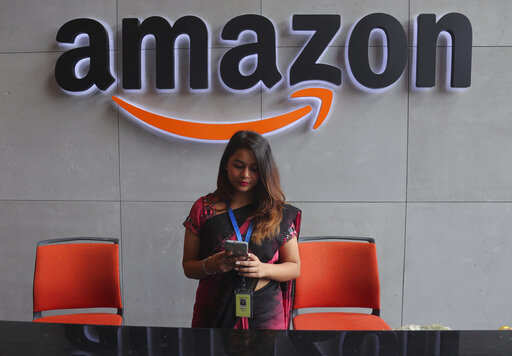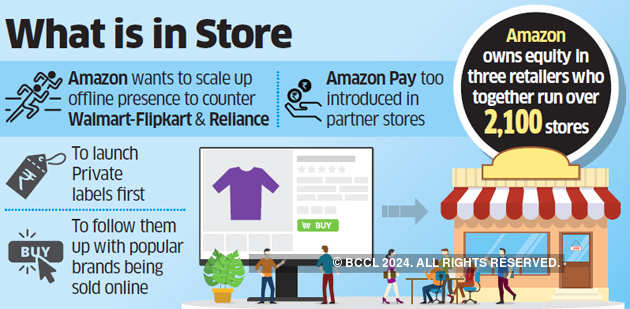 KOLKATA: Amazon is entering offline retailing in India to create an integrated shopping experience for consumers across e-commerce and brickand-mortar stores as part of a strategy to take on Reliance and Walmartowned Flipkart, which are planning a similar push in the country.
KOLKATA: Amazon is entering offline retailing in India to create an integrated shopping experience for consumers across e-commerce and brickand-mortar stores as part of a strategy to take on Reliance and Walmartowned Flipkart, which are planning a similar push in the country.The Seattle-based e-commerce behemoth has started talks with three retail chains in which it has picked up stake — Future Group, More and Shoppers Stop — to sell a range of products that are available on its Indian online marketplace, three senior industry executives said.
In the initial period, Amazon wants to sell its private label products in these stores and eventually scale up to include most of the top-selling products on the Indian online marketplace, they said.
Amazon wants to push one of its largest-selling private label brands globally — AmazonBasics — through more than 2,000 stores of these three retailers. AmazonBasics products include air-conditioners, vacuum cleaners, HDMI cables, batteries and cables, home necessities like bedsheets, towels, dinner plates and cutlery, and general merchandise like backpacks, umbrellas and yoga mats.
Amazon has been selling two apparel private brands — Prowl and Just F — through some Shoppers Stop outlets and this will be scaled up. The ecommerce company also plans to roll out its grocery and fashion private brands through these stores.
Emails sent to Amazon, Future and Shoppers Stop remained unanswered as of Wednesday press time. More Retail deputy managing director Mohit Kampani declined to comment.
A senior executive with a retail chain said while the share purchase agreement with Amazon does not cover the sale of products available on the online marketplace, the chain is likely to agree to the plan. “There is certainly no pressure to sell the products, but it’s a gesture we might extend,” he said, requesting anonymity.
Shoppers Stop, More and Future already sell some of their products through Amazon India online and its hyperlocal platform, Prime Now. Amazon’s payment service, Amazon Pay, has been launched at More and Shoppers Stop and will be rolled out in Big Bazaar and EasyDay, too.
An executive who took part in the talks said Amazon has sought inputs from the retail chains on how to best leverage the stores to sell its products.
“Amazon is firming up the pricing strategy for these products in the offline stores. It needs to ensure that they are sold at similar price in the stores as in the marketplace. Also, the retailers need to make money since Amazon wants significant shelf space and the margins offered as of now are quite less, unlike other brands in these categories,” the executive said.

Last month, Amazon agreed to acquire a 49% stake in Future Coupons, a promoter group company of Future Retail, which runs over 1,400 Big Bazaar and EasyDay stores. About a year ago, the ecommerce giant acquired More Retail (earlier called Aditya Birla Retail) along with Samara Capital. More currently runs over 620 stores. In 2017, Amazon acquired a 5% stake in Shoppers Stop, which currently has 83 stores.
Omni-channel or online-to-offline (O2O) may be the next big thing in India’s retail market. Last month, Reliance said its omni-channel plans are likely to roll out around Diwali.
No comments:
Post a Comment